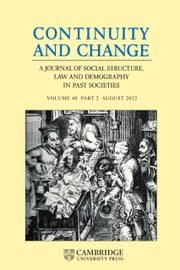Article contents
Law in action, law in books: the practicality of medieval theft law
Published online by Cambridge University Press: 20 May 2003
Abstract
This article approaches the medieval law of theft from a ‘functional’ perspective. It seeks, that is, to consider the rules of law principally in relation to the social circumstances which give rise to them and upon which they, in turn, have an impact. Concentrating primarily upon material from England and Wales, the essay considers general issues of definition, jurisdiction and proof in the law of the middle ages before concentrating specifically upon the rules respecting theft. The ideas of manifest and non-manifest theft are explored in an attempt to discover why the law distinguished between them. Potential difficulties concerning the bringing of theft actions and the defences which might be offered to them are also examined and related to the practical world in which perpetrators and victims of theft found themselves. Finally, the possible tension between the satisfaction of the demands of the individual victim and the wider desire to maintain public order is investigated.
- Type
- Research Article
- Information
- Copyright
- © 2002 Cambridge University Press
- 1
- Cited by


